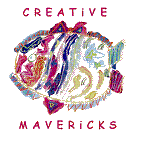
 |
Our Collaborative Ideas About Authentic Teaching and Learning: Sue Haynes, Lisa Plourde, Jane Disney, David Lamon, Cathy Kozaryn, Gwenn Kubeck, Tifin Calcagni, Megs Metz, and Sherri Clixby Authentic Teaching is:
|
In Authentic Learning students:
- set their own learning agendas
- take responsibility for their learning
- are agents of their own becoming
Teaching for Personal Empowerment
- Providing the "container" for safe exploration
From Marion Woodman in an interview with Michael Toms on the radio program New Dimensions:
...the energetic as well as the physical context in which one works with a learner...a container that loves the child for who she/he is, not what the agenda of the parent or the teacher is--but who is this little creature and what are his desires and his gifts? Who is this little soul who wants to live his own life?
-
Offering genuine choices
- Variety of activities
- Ask, "Would you be motivated to do this if I weren't hassling you?"
-
Utilizing curriculum is a means, not a goal
-
Recognizing individual talents and passions within shared community
-
Building on unique assets
-
Inviting the sharing of personal lives including your own
-
Bringing forth the latent potential in each individual
Teacher/Student Relationship
- Martin Buber's I-Thou relationship:
Genuine dialogue, like genuine fulfillment of relation involves acceptance of otherness. Influencing the other is not injecting one's own 'rightness' into him but is using one's influence to let what is recognized as right, just, and true take seed and grow in the substance of the other and in the form suited to his individuation.
- Honoring each individual beyond any labels
- Collaborating with a spirit of collegiality: all are teachers and all are learners
References:
Martin Buber's "I-Thou" relationship is quoted in The Educated Man: Studies in the History of Educational Thought by Nash, P., Kazamaias, A., Perkinson, H., 1965. New York: E Krieger Publishing Co.
Most of our pages are available in a printer-friendly, text-only, pdf format, readable by Adobe Reader. Need Adobe Reader? You can download it for free at Adobe.com